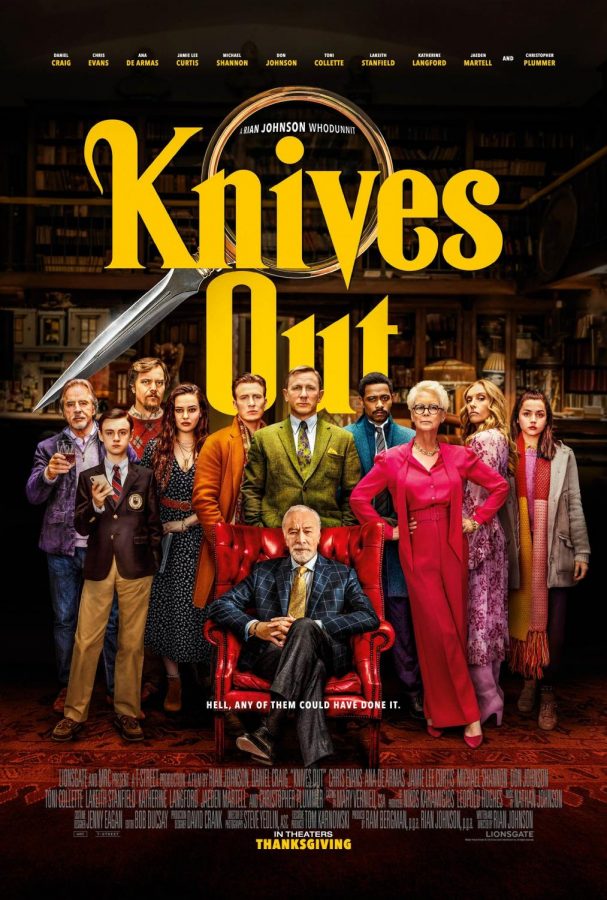Rian Johnson’s star-studded whodunit “Knives Out” is a smartly plotted and hilariously entertaining social commentary.
The film kicks off with the death of 85-year-old mystery writer Harlan Thrombey, played by Christopher Plummer. His varied and eccentric family rules it out as a suicide, but celebrity detective Benoit Blanc, played by Daniel Craig, has reason to believe it was otherwise; after all, any one of the family members is in a position to off their rich and deceptive patriarch. Brought into the case by a mysterious benefactor, Blanc connects the dots with the help of Thrombey estate caretaker Marta Cabrera, played by Ana de Armas, who seems to be the late Thrombey’s only genuine friend.
Craig is wickedly delightful with his thick-as-molasses Southern accent, which is a reassuring far cry from his James Bond days. He is the archetypal detective of the well-worn Agatha Christie paperbacks – and then some. Johnson and Craig provide a refreshing take on this particular trope that makes Blanc come off as pleasing.
Praise also goes to de Armas for delivering on her role as Marta. One of the up-and-coming actresses of her generation who is slated to join forces with Craig again in upcoming Bond flick “No Time to Die”, de Armas gets her worth as the unlikely heroine of the film. There is a certain satisfaction in watching her gradually taking her place as “part of this family”, to quote an ultimately rectified remark heard toward the start of the film.
The rest of the cast are passionately charismatic as they inhabit Johnson’s murder mystery game. Chris Evans steals the show with his role as Ransom, an irritable grandson of Harlan, and it’s also worth it to see Jamie Lee Curtis, who plays Thrombey’s daughter and “self-made” real estate mogul Linda, and Toni Collette, who plays socialite Joni. One downside to the huge cast, though, is that some of them end up being constantly upstaged by each other. It might be inevitable with an ensemble cast this huge, but still, there are some winners.
The theme of class warfare has been prevalent in this year’s cinema, from “Parasite” and “Hustlers” to “Joker” and “Us”. In the latest entry to the class-conscious category, “Knives Out” gleefully points out the hypocrisy of its rich and pampered characters, and then proceeds to wreck their decadent bubble from within. From the other side, there is Marta, who is never really valued by the Thrombey family beyond her status as a meek servant. In one of the hilarious running gags in the film, they do not remember which Latin American country is she from.
At the end of the day, “Knives Out” is a mystery film, and Johnson is the proverbial kid in a candy store. He excels in making a complex and layered plot that is reminiscent of his contemporary work. The film crackles with snappy dialogue and priceless gags while never losing sight of its intent as a serious mystery. Moreover, Johnson uses a lot of the mystery genre’s tropes that will please the average crime fiction aficionado, from mixing up time frames, an aura of distrust and the inevitable feeling that someone out there might be the culprit. He refreshingly subverts these tropes, avoiding the film from being a resoundingly dull affair expected of whodunits like the recently maligned remake of “Murder on the Orient Express”.
Thanks to cinematographer Steve Yedlin, the film shines visually without becoming too caught up in the glamour of the iconic Thrombey house. Numerous set pieces of statuettes and relics populate the home and are reminiscent of Alex’s cozy room in Stanley Kubrick’s “A Clockwork Orange”, with the best one being a de facto Iron Throne surrounded by a collection of vintage daggers positioned in a circular target formation.
Johnson carves out his own spin on the whodunit with “Knives Out”. He has skillfully blended an intricately structured whodunit with a critique on class divisions that doesn’t feel patronizing. More importantly, it ends on a satisfying high note, punctuated by one of the best closing shots of the year. Seeing the rich crumble under their own weight has never been this gratifying.









